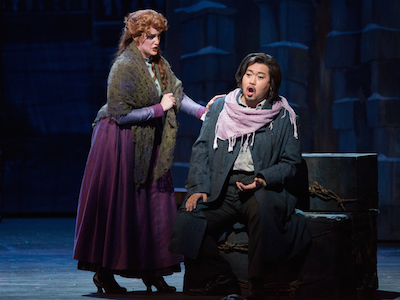
Photo by Kristen Loken
If San Francisco Opera's family productions didn't exist, they would have to be invented. The idea — and execution — is one of the greatest win-win propositions in music theater:
- The company is raising its future audience.
- The children — small, smaller, and seemingly impossible smallest, I mean age 3 or 4 — have the invaluable first experience of a live performance (yes, Virginia, there is life beyond screens), and what may well become that first opera getting them hooked for life. (I speak from experience.)
- The performers, almost all young, several current Adler Fellows or former Merolini, a kind of company farm team, get a big opportunity in the big house (the War Memorial, not a penitentiary venue).
- And, an unintended benefit for heroic ushers: a veritable dress rehearsal for the fast-approaching 30-performance run of twice-daily Nutcracker mania, which pits three dozen ushers against a mostly "first-time-in-the-opera-house" crowd of about 100,000, children in the majority, some easily prompted to cry, their parents often even more difficult to handle.
At the Saturday family matinee of Puccini's La bohème (what a perfect "first opera"!), I heard no crying, no noise beyond parents talking to their children, in general as good an atmosphere as you find at any regular performance (except opening night, traditionally impacted by what is imbibed at gala parties).
Although the same production as the rest of the Bohème run, the family performance had a helpful pre-curtain narration by Adler Fellow Efrain Solis, who then stepped back into the role of Schaunard.

A fellow Bohemian, the painter Marcello, whose love-hate relationship with Musetta is the counterpoint to the Rodolfo-Mimi affair, was portrayed by Joo Won Kang. The second-year Adler Fellow's powerful, melodious baritone was a high point of the afternoon.
The two female leads were both already well-known and acclaimed Adler Fellows: Julie Adams as Mimi and Maria Valdes as Musetta. Adams, one of César Ulloa's many prominent students, shone in yet another major role, her Blanche in Dialogues of the Carmelites, and another Blanche, in Previn's A Streetcar Named Desire, firmly in mind. Those and other performances took place in smaller venues, but her debut in the War Memorial made a convincing case for her future in any house.
Rodolfo, the tenor lead with a fine but smallish voice, was Eric Margiore, making his San Francisco debut; Scott Conner was Colline. The formidable and enduring Dale Travis once again conquered with the dual roles of Benoit and Alcindoro, making something memorable out of two usually throwaway comprimario portrayals.
The Café Momus scene — with Ian Robertson's Opera Chorus and San Francisco Boys Chorus, and Lisa Bielawa's San Francisco Girls Chorus — was more boisterous and prominent than during the regular run, appealing strongly to fellow boys and girls in the audience.
Dennis Doubin's debut as conductor gets a passing grade, as he led the singers ahead of the orchestra, but it all came together, at least in the perception of those who hear this glorious warhorse in their head.
How great was the occasion? A friend with husband, daughter, son-in-law, two other adult children, and six grandchildren in tow, told me before the performance that her main concern was that the young ones of the tribe remain under control. At the intermission, glowing with pleasure from the performance, she said she is buying tickets for a family matinee next year. (Probably The Magic Flute.)
No need to wait that long — the Bohème family matinee will be repeated at 1 p.m. on Nov. 29. Not sure if there are tickets left in the 3,146-seat auditorium, but you can always look.
When I checked on Monday, there were only 25 seats available in the orchestra, but over 100 in the balcony. It's important to know that the less expensive balcony seats provide excellent acoustics, and thanks to OperaVision — HD video screens from the Koret-Taube Media Suite — there are better closeups of the performance than from anywhere in the orchestra.

